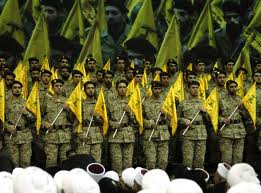 White House counterterrorism chief John O. Brennan said Friday that European failure to join the United States in designating the Lebanon-based militant group Hezbollah a terrorist organization is undermining international counterterrorism efforts.
White House counterterrorism chief John O. Brennan said Friday that European failure to join the United States in designating the Lebanon-based militant group Hezbollah a terrorist organization is undermining international counterterrorism efforts.
“Let me be clear,” Brennan said in a speech in Dublin, European resistance “makes it harder to defend our countries and protect our citizens.”
Brennan listed Hezbollah at the top of a list of joint U.S. and European security challenges. In addition to its alliance with terrorist activities by Iran, he said, “we have seen Hezbollah training militants in Yemen and Syria.”
The Obama administration has previously accused Hezbollah of training Syrian government forces fighting an armed uprising in that country. Early this year, it also charged Hezbollah with facilitating Iranian arms shipments to Shiite separatists in Yemen, although it did not say there was on-the-ground training there.
The United States first designated Hezbollah as a “global terrorist” organization in 1995, seizing U.S. assets and prohibiting anyone in this country from providing it with material or financial support. While some countries in the European Union, including Britain and the Netherlands, have argued the Europeans should follow suit, the E.U. and individual governments have argued that there is no tangible evidence the group has undertaken terrorist acts in Europe.
Led by France, some Europeans have said that their influence and relations with Lebanon — where Hezbollah provides extensive social services and its political wing holds government power — would be damaged by the designation.
But the administration, along with Israel and many U.S. lawmakers, has recently stepped up a years-long effort to pressure Europe, saying that money flows from there to support terrorist activities by Hezbollah and Iran.
In addition, Brennan said in prepared remarks for a speech to Dublin’s Institute of International and European Affairs, countries that have arrested Hezbollah suspects for plotting in Europe have been unable to prosecute them on terrorism charges.
Brennan cited kidnapping for ransom, by both terrorist groups and pirates, as another challenge, and indirectly criticized European governments and individuals for encouraging such activities by paying ransom. Pressure on al-Qaeda’s ability to “raise, move and use funds,” he said, had led that group and its affiliates, particularly in Africa, to “increasingly turn to kidnapping operations and efforts to extract large ransoms from governments, private companies and other governmental organizations.”
He said al-Qaeda and allied groups had “reaped at least $120 million in ransom payments” since 2004, while pirates operating off the coast of Somalia had received $140 million just in 2011.
Ransom payments, he said, “many of which come from Europe,” create a “vicious circle — fueling the very criminality, violence and terrorism that we seek to stop.”
“From President Obama on down, we continue to urge our allies and partners to resist the temptation to pay,” Brennan said.
Washington Post

Leave a Reply
You must be logged in to post a comment.